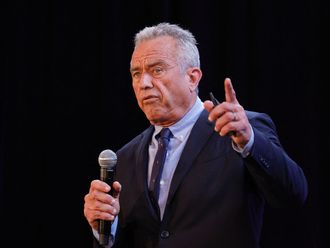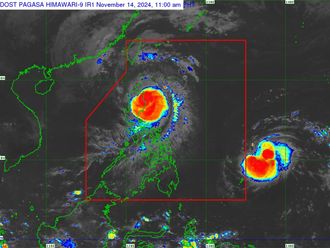Havana: Cuba has charged a Spanish citizen with the equivalent of vehicular manslaughter in a car accident that killed prominent dissident Oswaldo Paya and another government opponent, official media said on Tuesday.
Angel Carromero, who was driving the car carrying Paya when it crashed in eastern Cuba July 22, “has been accused of the charge of homicide while driving a vehicle on public roads,” Communist Party newspaper Granma said.
Under the penal code, a person convicted of violating traffic laws or rules resulting in the death of another can be sentenced to one to 10 years in prison.
In videotaped testimony played for journalists Monday, Carromero said he lost control of the car when it suddenly entered an unpaved area of road under construction and he slammed on the brakes, causing it to skid.
An investigation found that Carromero was speeding and failed to heed traffic signs warning of the construction. Cuban authorities had hinted earlier that charges might be forthcoming.
The next step is for prosecutors to formally say what sentence they will seek, according to a Spanish Embassy spokesman. He said Carromero was transferred to Havana and received a consular visit there on Monday.
“He is in good health and calm,” spokesman Francisco de Borja said.
Granma said Carromero and Swedish citizen Jens Aron Modig, who was also riding in the car, entered the country July 19 on tourist visas and, “in violation of their migratory status, got involved in clearly political activities contrary to the constitutional order.”
Both Carromero and Modig are affiliated with conservative political parties in their home countries. They said they brought 4,000 euros ($4,900) for Paya’s organisation and helped organise dissident youth wings.
Cuba’s government considers the small opposition to be subversive, and objects to foreign-based efforts to support them.
Granma pointedly said that Modig was allowed to return to Sweden “in spite of the illegal activities he carried out.”
Modig tweeted Tuesday that he was back in Stockholm and needed rest. “Have European soil under my feet. So nice!”
“I’m very happy that Aron Modig is now in Sweden again and is resting with his family,” Christian Democrats party leader Goran Hagglund said in a statement. “It’s been a period of great worry after this horrific accident. ... We’re proud of (Modig’s) efforts for democracy and freedom.”
Elizardo Sanchez, a de-facto spokesman for the Cuban opposition, insisted that doubts will remain until both Europeans are able to speak from their own countries.
“Whatever they say while in the hands of police or the government of Cuba is necessarily skewed, contaminated, due to the lack of guarantees,” Sanchez said. “The Swede can’t speak freely because his friend is still prisoner in Cuba.”
In the long, unsigned editorial titled “Truth and Rightness,” which took up half of the newspaper’s first two pages, Granma railed against a series of “counterrevolutionary” attempts against its sovereignty, blaming foreign interests in Madrid, Stockholm, Washington and Miami.
“They dream of destabilising the country, creating conditions to repeat what happened in Libya and Syria and provoking a US military intervention,” the newspaper said.
The editorial ticked off a list of purported attempts to stir unrest and foment dissent through social media and cellphones, and longtime complaints about US contacts with the dissidents and USAID democracy-building programs.
Since 2009 Cuba has held American citizen and USAID subcontractor Alan Gross, sentenced to 15 years under a statute governing crimes against the state after he was discovered importing communications equipment onto the island and setting up satellite Internet networks.
Granma also alleged that in March, eight Mexican youth traveled to Cuba on tourist visas with the intention of distributing propaganda, inciting protest and disrupting Pope Benedict XVI’s visit.
Later Tuesday, Cuban state television aired a 15-minute programme including video of four Mexicans who were detained. They told the cameras their objective was to distribute “subversive” material including flyers and to deliver computing equipment, cell phones, memory sticks and documents to dissidents. They said they wanted to encourage dissidents to occupy churches, protest in the streets and generally make the Cuban government look bad and “provoke” a reaction.
The Mexicans were subsequently deported. Four others apparently came and left unbothered.
The programme said they were “recruited” by anti-Castro groups in Florida and a man identified by Granma as Rene Bolio Hollaran, a former member of Mexico’s conservative National Action Party, or PAN.
The mini-documentary offered few and confusing details of the purported operation and did not explain clearly the links between those involved or how they were recruited, nor did it say why the information was being unveiled four months after Benedict’s March 26-28 visit.
Rodrigo Ivan Cortes, the PAN’s secretary for international affairs, said someone with the name of Rene Bolio Hollaran apparently belonged to the party at one point, but no longer, and brushed off the allegation.
“This is a smoke bomb to distract attention from the core problem, which is an authoritarian regime that does not respect fundamental rights like association and expression,” Cortes said. “This has no substance or grounding.”
Granma also criticized the US State Department, Republican presidential candidate Mitt Romney and the Chilean presidency for being among a “handful of slanderers” who called for a transparent probe of the crash.
Soon after the July 22 accident, speculation spread that a second vehicle was pursuing the car carrying Paya and might even have run it off the road, leading dissidents and others to demand transparency.
Carromero and Modig said no other car was involved, but Paya’s family said it reserved the right to doubt the official account and asked to speak independently with the witnesses.











